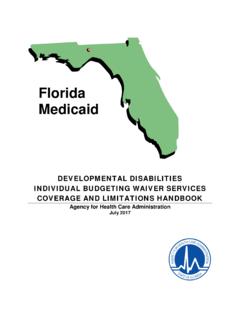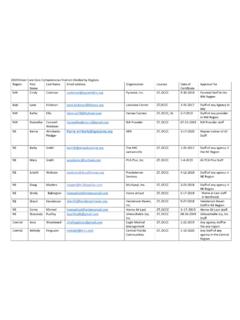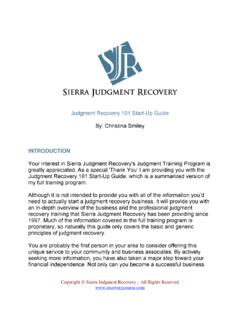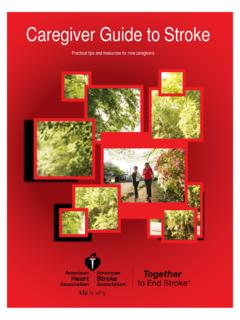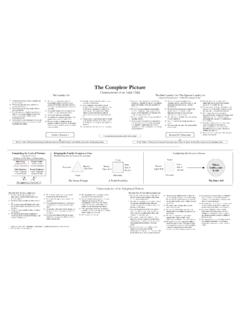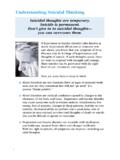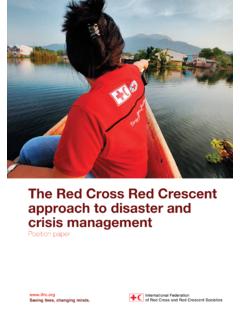Transcription of Direct Care Core Competencies (DCCC)Course …
1 Direct care core Competencies ( dccc )CourseLearner's Guide 2016 This guide is designed for use with the Direct care core Competencies course dccc course Learner s Guide 2016 dccc course Learner s Guide 2016 Table of ContentsTitle Page Purpose of course Module 1 Basic Person-Centered Planning Module 2 Introduction to Developmental Disabilities Module 3 Maintaining Health, Safety, and Wellness Module 4 Individual Choices, Rights, and Responsibilities Module 5 Roles and Responsibilities of Direct Support Professionals End of course / How to Find course Assessment APPENDICES 1 Emergency Response Sheet 2 Natural Disaster Preparedness Sheet 3 Emergency Recovery Information Sheet 4 Decision Tree for Response to Emergency and Non-Emergency Situations 5 Drug Information Sheet 6 Bill of Rights for Persons with Developmental Disabilities Ch. (3), 121223556677788082858687 dccc course Learner s Guide 2016 dccc course Learner s Guide 2016 Welcome to Direct care core Competencies dccc Slide 1 Welcome to the Direct care core Competencies course .
2 This course will provide you with information about the roles and responsibilities of Direct support professionals. Purpose of course Slide 2 The purpose of the Direct care core Competencies course is to introduce you to the knowledge, skills, and terms that will assist you in applying and delivering maximum standards of care as a Direct support professional. course Modules Slide 3 This course has five modules. Each module begins with a list of learning objectives. There is an assessment at the end of the course based on all of the learning objectives. The five modules are: 1. Basic Person-C entered to Developmental Health, Safety, and Choices, Rights, and and Responsibilities of Direct Support ProfessionalsThe estimated completion time for this course is 2 hours. 1 dccc course Learner s Guide 2016 Slide 4 Welcome to Module 1 Person-Centered Planning emerged from a desire to serve the best interests of individuals with disabilities by first changing the way we think about disabilities.
3 Person-Centered Thinking is the philosophy of Person-Centered Planning. It is choosing to think about and focus on the person s strengths, abilities, and aspirations, rather than focusing on the person s disabilities. Module 1 Objectives Slide 5 By the end of Module 1 you should be able to: Identify the key elements in successful Person-Centered Planning Provide examples of Person-C entered Planning and self-direction Recognize components to self-direction and empowerment, and Be familiar with barriers to empowermentWhat Does Person-Centered Planning Mean? Slides 6-7 Person-Centered Planning means the individual directs his or her own life . As a Direct support professional, it is vital that you assist the individual in finding options that are best suited to their goals and work with their supports to help achieve them. This module will define the term Person-Centered Planning and instruct you on how Person-Centered Planning is essential to provide quality support for the individual by encouraging them, and providing them with the freedom to make their own decisions.
4 The Person-Centered Planning requirements for individuals in Home and Community Based Services (HCBS) settings are defined under the 1915 HCBS Waiver and the 1915 IHCBS State Plan authorities. Person-Centered Planning is an individualized approach that helps the individual with a developmental disability discover what he or she really wants by focusing on what is important, regarding: Module 1: Basic Person-Centered Planning 2 dccc course Learner s Guide 2016 How they want to live Input from those who love them Health and safety (from their perspective) Continuous evaluation Being respectful of the individual, the family, and those who support theindividual, and Taking the time and eff ort necessary to make sure the individual s voice ishe ard, regardless of the disabilityKnow the Individual Slide 8 The best way to get to know people is to spend time with them. This is just as true of the individuals you will work with as it is with anyone else.
5 Talk with the individual. Go places with him or her. Pay attention not just to what the individual says, but also to what he or she does. Watch how they respond to particular events. Note how he or she chooses to spend their free time. This will provide you with a lot of information about the individual. Self-Directed Slide 9 Every individual has feelings, preferences, hopes, and aspirations. Consider the individual s needs and thoughts when establishing supports, and in achieving their aspirations. It is important to place value in the choices of services and supports the individual would like to maintain, and allow the individual to Direct the course of the planning. Remember, individuals with disabilities may need support in addressing the assumptions and perspectives held by others regarding people with disabilities. Person-Centered Empowerment Slide 10 A Person-Centered Plan can be completed at any time, but for the process to be meaningful and beneficial, the individual s circle of support must be a part of the planning process.
6 All participants are encouraged to become active in the process of discovering and understanding the individual s needs, wishes, and aspirations. Use your communication skills to avoid questions with boundaries. Use the individual s preferred communication style. For example, if needed, use visual prompts for the individual s primary communication. Listen, give value, and encourage empowerment. 3 dccc course Learner s Guide 2016 The following tenets of Person-Centered Planning ( Slide 11) require a commitment from all parties: To know and to understand To be of genuine service To be open to being guided by the individual To be willing to struggle for difficult goals To be flexible, creative, and open to trying what might be possible To be willing to enhance the humanity and dignity of the individual, and To look for the good in people and to help bring it outBeing Respectful Slide 12 Person-Centered Planning allows the individual to feel respected.
7 When a Direct support professional takes the time and effort to make sure an individual s voice is heard, regardless of their disability, then the individual is allowed to focus on what is important to them. We listen to and respect the individuals we work with, and plan continuously. Respect can be shown by encouraging and allowing the individual to: Have the opportunities to explore and expand their choices and options Develop and expand natural supports through circles of support and similarinformal support networks Make life decisions Express how they want to live Get input from the people who love them, and Let you help ensure they feel healthy and safeContinuous evaluation of all parts of the Agency for Persons with Disabilities (APD) service delivery system will focus on these examples. Respectful Language Slides 13-14 Respectful language refers to a way of speaking about an individual with a developmental disability that makes sure you are speaking first and foremost about the person, not their disability.
8 In other words, individuals with disabilities prefer to be referred to with language that respects their humanity, abilities, talents, and values. They wish to be addressed first as an individual, and not as a disability. The following lists are examples of respectful and disrespectful words and phrases, in regards to individuals with disabilities. 4 dccc course Learner s Guide 2016 Relationships Slide 15 In the center of important relations, are personal networks. These networks are most often made up of: Family members People in the community Service providers, and FriendsFamily members are generally people who are most important to the individual, who are close to and see the individual often, such as parents. This group can also include family members they see less often than those that are nearby. People in the community are those who mean a lot to the individual, such as their employer. The group also includes the people in the community they associate with, such as doctors, or church pastors.
9 Service providers can include people the individual feels close to, and also people who provide services that they like. Friends include people who are important and close to the individual as well as people they have met and like, but may be acquaintances. Barriers Slide 16 Individuals with developmental disabilities may often be isolated or discriminated against because they may learn more slowly or may not learn as much. Communication challenges often prompt others to believe individuals with disabilities are not capable. Respectful words and phrases: People with disabilities Individual with autism Individual with Down Syndrome Individual who requires intensive or additional care Individual with an orthopedicdisability Congenital disability Typical or people withoutdisabilities Wheel chair userDisrespectful words and phrases: Handicapped and the disabled An autistic A Down s child Afflicted with, suffers from Drain, burden Crippled or lame Birth defect Normal5 dccc course Learner s Guide 2016 Caregivers of the individuals need to focus on allowing the development of independence, and overcoming these barriers, while using the adaptations needed for the individual to interact.
10 What Can Be Done Slide 17 Development of independence, and overcoming barriers can be achieved by listening to what the individual says. Help them be the owner of their life plans, and to take responsibility for their choices and decisions. Interests Slides 18-20 It is important to get to know the individual so you can help them become more independent and confident in making their own life choices. Here are some examples of questions to help find out information about the interests of the individual: What are some of the great things about you? What are you good at doing? What are your interests? What do you enjoy doing? When getting to know the individual, ask them what they like about their life , and what they would change about their life . The answers to these questions will help you to learn more about what is important to the individual and to discover better ways to communicate with them. Additional questions can include asking the individual about the personal qualities that are needed to appreciate and enhance their life .



